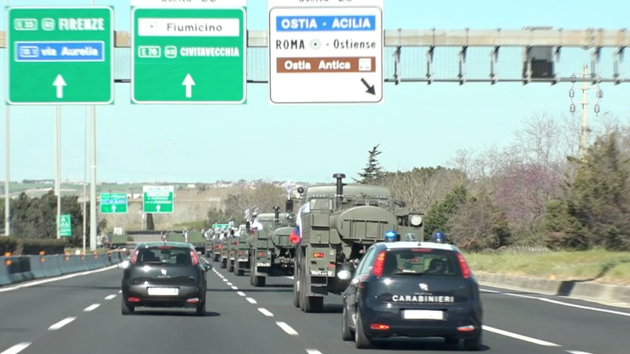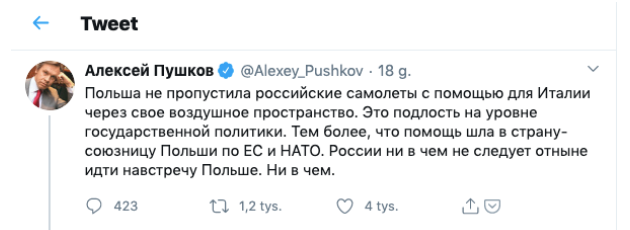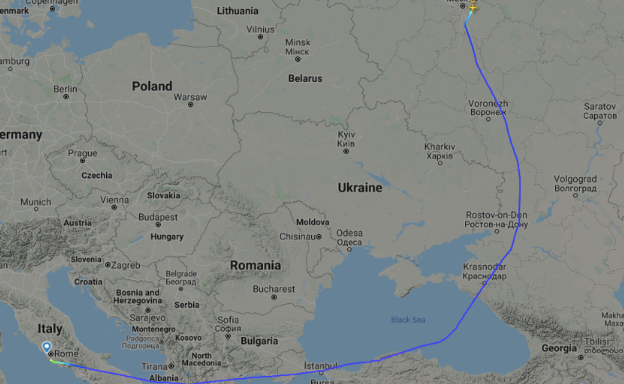

by John Helmer, Moscow
@bears_with
On Sunday, March 22, Russia’s Defence Ministry sent more than fifteen Ilyushin heavy transport planes to Rome with medical aid to Italy, setting up a special medical headquarters at Bergamo, in the Lombady region of northern Italy. This is the largest Russian aid operation in Europe since World War II.
To avoid US intervention to stop it, the air convoy flew across Turkish and Greek airspace, avoiding Ukraine and Poland. As military secrets go, the operational plan devised by Russian Defence Minister Sergei Shoigu and his Italian counterpart, Lorenzo Guerini, was a near-perfect success.
Recriminations followed the next day from the Financial Times which accused Moscow of trying to “exploit EU tensions over medical export bans and delays in financial support.” The newspaper quoted the director of an Italian think-tank, Nathalie Tocci, as saying “Russia needs a quick win, so it wants to act fast…It does what Russia always does, which is seize low-hanging fruit.” Tocci and her think-tank are employed by NATO, the European Commission, the European External Action Service, and the European Defence Agency.
The Russians and Italians have been discussing a military-scale medical aid plan for some time. Exactly how long isn’t known, nor did it leak into the press.
President Vladimir Putin acknowledged the preliminaries in the communiqué issued by the Kremlin on Saturday evening (March 21) following his telephone conversation with Italian Prime Minister Giuseppe Conte. “There are plans,” the communiqué said, “to deliver protective equipment, KAMAZ truck-mounted units for disinfectant spraying of vehicles and territories, medical and other equipment, as well as to send teams of Russian specialists to render practical assistance in the worst-hit areas of the country. The deliveries will be carried out by the Defence Ministry using the Russian Federation Aerospace Forces aircraft.”
The Kremlin reported that Putin had initiated the call to Conte. In retrospect, it is now certain the defence ministers Shoigu and Guerini had been working on the operation for days before; the Kremlin call was the public announcement on which the two sides agreed in advance.
The Russian Defence Ministry then issued two short press briefings by general-rank officers.

Listen to the briefings of Colonel-General Dmitry Trishkin, Chief of the Main Military Medical Department, and Lieutenant-General Igor Kirillov, Chief of the Radiation, Chemical and Biological protection forces, here.
Boris Rozhin, author of the Colonel Cassad website in Moscow, then published pictures of the arrival of the aircraft and materiel in Rome on Sunday evening (March 22), and the deployment to Lombardy the following morning.

Source: https://colonelcassad.livejournal.com/

Source: https://colonelcassad.livejournal.com/
“Practical experience in combating an epidemic in a new area,” Rozhin acknowledged, was one of the Russian objectives. “The political subtext [is that by] assisting Italy, the Russian Federation continues to play on the contrast [with other EU states], reinforcing the Italian front in relation to the European policy of sanctions against Russia. Of course, this assistance will … strengthen the position of those forces which support the lifting of sanctions.”
Alexei Pushkov, a senior Duma deputy, tweeted that the Polish authorities had refused overflight permission for the aerial convoy.

“Poland did not allow Russian airplanes helping Italy through its airspace. This is meanness at the level of public policy. All the more so because the aid went to Poland's ally in the EU and NATO. From now on, Russia should not meet Poland. In anything!” Source: reproduction of the tweet by Alexei Pushkov on March 23 by https://www.defence24.pl/. The original tweet can no longer be found on Pushkov’s twitter feed.
He also attacked US Secretary of State Michael Pompeo for public statements critical of the Russian and a parallel Cuban medical aid mission to Italy. “Secretary of State Pompeo — these are not your doctors, but Russian military doctors are going to save Italians while you make up fables about ‘Russian disinformation’.”
A day later on March 24, the Polish Defence Ministry told Juliusz Sabak, a reporter for the Warsaw outlet Defence 24, that Pushkov’s claim was untrue. “The response of the Ministry of National Defence in this matter is brief and unambiguous – the Russian side did not submit an application for entry into Polish airspace.” Speaking for the Polish military, Sabak accused Pushkov of orchestrating an “intensive propaganda campaign… It is one of many actions aimed at confronting NATO and EU member states on the occasion of a pandemic and the strong emotions associated with it.”

Defence 24’s map of the southern route taken by the Russian air convoy from Moscow to Rome; the detour is estimated to have added more than a thousand kilometres to the 1,300 km flight distance between Warsaw and Rome. Source: https://www.defence24.pl/
The Warsaw source also reported that “[civilian] Russian planes also fly over Poland without any restrictions, as evidenced by today’s Aeroflot flight from Moscow to Rome, whose route ran over Poland.”
“Why did the Russian Ministry of Defence choose the much longer route through Turkey, Greece and Albania?” Without identifying his Polish official sources, Sabak reported “the advantage of the southern route, which Russian assistance has recommended to Italy, is also its course, let’s call it conventionally – political… It is good if Poland does not pay the image price this time. Acting quickly cuts speculation with a clear and simple message — you can avoid further promotion of such false information.”
Pushkov was asked to respond to the Polish claim that there had been no Russian application for overflight permission. He declined to say.
Russian military sources believe the air convoy of fifteen aircraft, loaded with men and equipment, was so unusual and, until it commenced, so secret, there had been reluctance on the part of the Russian authorities to inform the Poles. Had they done so, there was apprehension in Moscow that the US and Poland would combine in an attempt to block, sabotage or discredit the operation in the media.
In retrospect, the Russian sources also believe, the planning negotiations between Shoigu and Guerini, with the authorization of both Putin and Conte, were carried off without the US or NATO discovering.











Leave a Reply